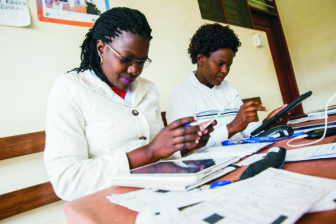
3 ways immunization data tools are flexing to fight COVID-19 in Africa
Apr 24, 2020
Digital and data tools and approaches first introduced to strengthen immunization services can be used to understand and curb the devastating impacts of pandemics like COVID-19.
Read More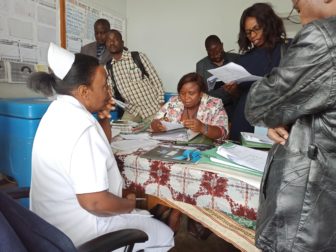
Countries gather in Lusaka for BID Learning Network meeting to strengthen digital and data capacity
Mar 24, 2020
Posted in BID Learning Network (BLN), People
For Silemane Ouedraogo, an Expanded Programme on Immunization (EPI) Data Manager in Burkina Faso, one of the most beneficial parts of the BID Learning Network (BLN) is the opportunity to learn from his peers about the digital health systems and technologies that have worked in their own countries. As countries figure out how to make use of limited resources for their health systems, this country engagement is irreplaceable.
Read More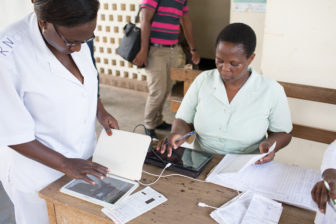
The costs of electronic immunization registries, sharing BID’s experience to help other countries plan
Mar 17, 2020
Posted in Packaging, Policies & Practices, Products
Read More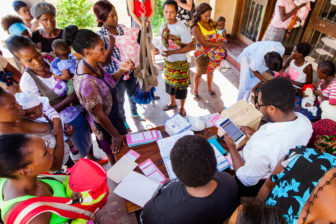
Case study celebrates lessons and catalytic potential of rapid, iterative software development across three countries
Feb 26, 2020
Posted in Packaging, Policies & Practices, Products
Pakistan, Zambia, and Kenya are among a growing number of countries implementing electronic immunization registries (EIRs) to improve data quality and health facility performance. But EIRs can be costly to design and introduce. Seeking a solution that had already demonstrated proof of concept, these countries turned to the Open Smart Register Platform (OpenSRP), a mobile health platform based on global standards of care that allows frontline health workers to electronically register and track individuals for immunization.
Read More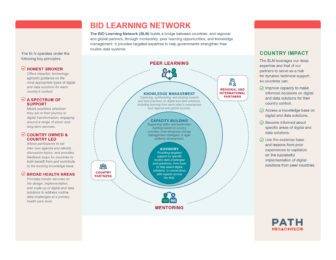
BID Learning Network expands services, mentoring countries across sub-Saharan Africa in digital and data solutions
Feb 19, 2020
Posted in BID Learning Network (BLN), People, Policies & Practices, Products
The BID Learning Network (BLN) brings together digital health experts and immunization program managers from across sub-Saharan Africa to exchange experiences in implementing electronic immunization registries (EIRs), data management systems, change management approaches, and data use policies and practices. As countries across the world embrace digital solutions, PATH is drawing on its experience in designing, introducing, and scaling digital and data tools in Tanzania and Zambia to help countries address routine data challenges focusing at primary health care level.
Read More
New strategy and systems cement Tanzania’s digital health leadership
Feb 18, 2020
Posted in Policies & Practices
The Government of Tanzania is calling for an end to “pilotitis”—an emphasis on narrowly focused health interventions, small populations, and vertical health programs. Last November, the country made great strides toward this goal and digital transformation with the launch of a new Digital Health Strategy (2019—2024) and a series of systems that will greatly improve coordination between partners in the health sector.
Read More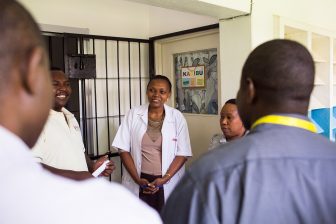
Lessons from the frontlines of the digital revolution: The BID Learning Network mentors countries invested in digital solutions
Jan 23, 2020
Posted in BID Learning Network (BLN), People, Policies & Practices, Products
Since 2014, the BID Learning Network (BLN) has brought together digital health experts and immunization program managers from across sub-Saharan Africa to share experiences about implementing electronic immunization registries (EIRs), data management systems, change management approaches, and data use policies and practices. The BLN has since expanded its scope to provide a set of holistic services and mentorship on the design, implementation, and scale-up of digital and data solutions to address routine data challenges. For the past few years, the BLN has been mentoring a range of countries interested in adopting digital and data solutions of their own.
Read More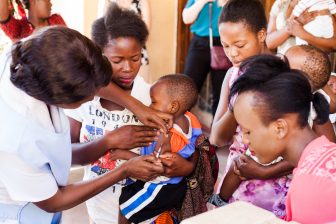
Zambia’s Ministry of Health collaborates with BID and others to strengthen immunization system
Jan 9, 2020
Posted in Practices
The Zambian Ministry of Health (MOH) is taking an innovative, new direction to close the country’s immunization gap with a new partnership that touches every component of the immunization system. The EPI Optimization (EPI-OPT) strategy brings together a consortium of technical experts and partners working collaboratively with the government to improve coverage rates.
Read More
Publication round-up: BID publishes new costing data, learnings, and best practices
Dec 3, 2019
Posted in Packaging, People, Policies & Practices, Practices
The BID Initiative is committed to advancing the global evidence base around data quality and use interventions to improve immunization service delivery. Informed by our own progress in Tanzania and Zambia, we recently published a series of journal articles and publications that demonstrate the impact of electronic immunization registries (EIRs) on cost savings, vaccine stock levels, and data quality, among other areas. This is a round-up of recent publications and some of the learnings from each.
Read More
New Vietnam case study highlights lessons learned around key partnerships with mobile network operators and electronic immunization registries
Oct 18, 2019
Posted in Packaging, Policies & Practices, Products
The Introducing Digital immunization information systems- Exchange And Learning (IDEAL-VN) project is a PATH-led initiative working to explore and disseminate evidence and lessons learned from Vietnam’s implementation of the, Vietnam’s nationwide electronic immunization registry (EIR), to support successful implementation of EIRs in other countries.
Read More